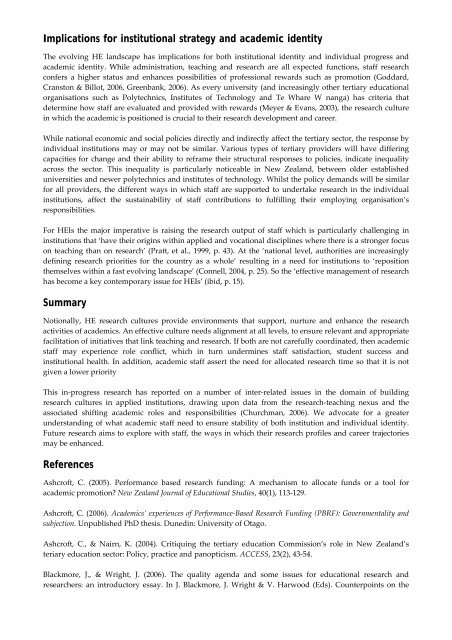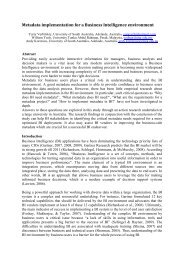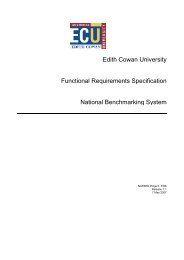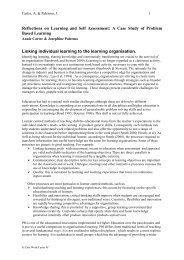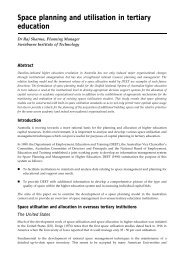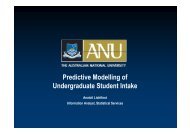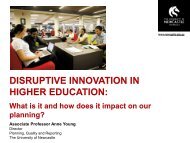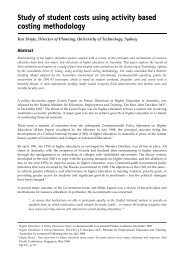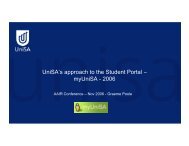Research in progress: Mapping the terrain of two applied ...
Research in progress: Mapping the terrain of two applied ...
Research in progress: Mapping the terrain of two applied ...
You also want an ePaper? Increase the reach of your titles
YUMPU automatically turns print PDFs into web optimized ePapers that Google loves.
Implications for <strong>in</strong>stitutional strategy and academic identity<br />
The evolv<strong>in</strong>g HE landscape has implications for both <strong>in</strong>stitutional identity and <strong>in</strong>dividual <strong>progress</strong> and<br />
academic identity. While adm<strong>in</strong>istration, teach<strong>in</strong>g and research are all expected functions, staff research<br />
confers a higher status and enhances possibilities <strong>of</strong> pr<strong>of</strong>essional rewards such as promotion (Goddard,<br />
Cranston & Billot, 2006, Greenbank, 2006). As every university (and <strong>in</strong>creas<strong>in</strong>gly o<strong>the</strong>r tertiary educational<br />
organisations such as Polytechnics, Institutes <strong>of</strong> Technology and Te Whare W nanga) has criteria that<br />
determ<strong>in</strong>e how staff are evaluated and provided with rewards (Meyer & Evans, 2003), <strong>the</strong> research culture<br />
<strong>in</strong> which <strong>the</strong> academic is positioned is crucial to <strong>the</strong>ir research development and career.<br />
While national economic and social policies directly and <strong>in</strong>directly affect <strong>the</strong> tertiary sector, <strong>the</strong> response by<br />
<strong>in</strong>dividual <strong>in</strong>stitutions may or may not be similar. Various types <strong>of</strong> tertiary providers will have differ<strong>in</strong>g<br />
capacities for change and <strong>the</strong>ir ability to reframe <strong>the</strong>ir structural responses to policies, <strong>in</strong>dicate <strong>in</strong>equality<br />
across <strong>the</strong> sector. This <strong>in</strong>equality is particularly noticeable <strong>in</strong> New Zealand, between older established<br />
universities and newer polytechnics and <strong>in</strong>stitutes <strong>of</strong> technology. Whilst <strong>the</strong> policy demands will be similar<br />
for all providers, <strong>the</strong> different ways <strong>in</strong> which staff are supported to undertake research <strong>in</strong> <strong>the</strong> <strong>in</strong>dividual<br />
<strong>in</strong>stitutions, affect <strong>the</strong> susta<strong>in</strong>ability <strong>of</strong> staff contributions to fulfill<strong>in</strong>g <strong>the</strong>ir employ<strong>in</strong>g organisation’s<br />
responsibilities.<br />
For HEIs <strong>the</strong> major imperative is rais<strong>in</strong>g <strong>the</strong> research output <strong>of</strong> staff which is particularly challeng<strong>in</strong>g <strong>in</strong><br />
<strong>in</strong>stitutions that ‘have <strong>the</strong>ir orig<strong>in</strong>s with<strong>in</strong> <strong>applied</strong> and vocational discipl<strong>in</strong>es where <strong>the</strong>re is a stronger focus<br />
on teach<strong>in</strong>g than on research’ (Pratt, et al., 1999, p. 43). At <strong>the</strong> ‘national level, authorities are <strong>in</strong>creas<strong>in</strong>gly<br />
def<strong>in</strong><strong>in</strong>g research priorities for <strong>the</strong> country as a whole’ result<strong>in</strong>g <strong>in</strong> a need for <strong>in</strong>stitutions to ‘reposition<br />
<strong>the</strong>mselves with<strong>in</strong> a fast evolv<strong>in</strong>g landscape’ (Connell, 2004, p. 25). So <strong>the</strong> ‘effective management <strong>of</strong> research<br />
has become a key contemporary issue for HEIs’ (ibid, p. 15).<br />
Summary<br />
Notionally, HE research cultures provide environments that support, nurture and enhance <strong>the</strong> research<br />
activities <strong>of</strong> academics. An effective culture needs alignment at all levels, to ensure relevant and appropriate<br />
facilitation <strong>of</strong> <strong>in</strong>itiatives that l<strong>in</strong>k teach<strong>in</strong>g and research. If both are not carefully coord<strong>in</strong>ated, <strong>the</strong>n academic<br />
staff may experience role conflict, which <strong>in</strong> turn underm<strong>in</strong>es staff satisfaction, student success and<br />
<strong>in</strong>stitutional health. In addition, academic staff assert <strong>the</strong> need for allocated research time so that it is not<br />
given a lower priority<br />
This <strong>in</strong>‐<strong>progress</strong> research has reported on a number <strong>of</strong> <strong>in</strong>ter‐related issues <strong>in</strong> <strong>the</strong> doma<strong>in</strong> <strong>of</strong> build<strong>in</strong>g<br />
research cultures <strong>in</strong> <strong>applied</strong> <strong>in</strong>stitutions, draw<strong>in</strong>g upon data from <strong>the</strong> research‐teach<strong>in</strong>g nexus and <strong>the</strong><br />
associated shift<strong>in</strong>g academic roles and responsibilities (Churchman, 2006). We advocate for a greater<br />
understand<strong>in</strong>g <strong>of</strong> what academic staff need to ensure stability <strong>of</strong> both <strong>in</strong>stitution and <strong>in</strong>dividual identity.<br />
Future research aims to explore with staff, <strong>the</strong> ways <strong>in</strong> which <strong>the</strong>ir research pr<strong>of</strong>iles and career trajectories<br />
may be enhanced.<br />
References<br />
Ashcr<strong>of</strong>t, C. (2005). Performance based research fund<strong>in</strong>g: A mechanism to allocate funds or a tool for<br />
academic promotion New Zealand Journal <strong>of</strong> Educational Studies, 40(1), 113‐129.<br />
Ashcr<strong>of</strong>t, C. (2006). Academics’ experiences <strong>of</strong> Performance‐Based <strong>Research</strong> Fund<strong>in</strong>g (PBRF): Governmentality and<br />
subjection. Unpublished PhD <strong>the</strong>sis. Duned<strong>in</strong>: University <strong>of</strong> Otago.<br />
Ashcr<strong>of</strong>t, C., & Nairn, K. (2004). Critiqu<strong>in</strong>g <strong>the</strong> tertiary education Commission’s role <strong>in</strong> New Zealand’s<br />
teriary education sector: Policy, practice and panopticism. ACCESS, 23(2), 43‐54.<br />
Blackmore, J., & Wright, J. (2006). The quality agenda and some issues for educational research and<br />
researchers: an <strong>in</strong>troductory essay. In J. Blackmore, J. Wright & V. Harwood (Eds). Counterpo<strong>in</strong>ts on <strong>the</strong>


